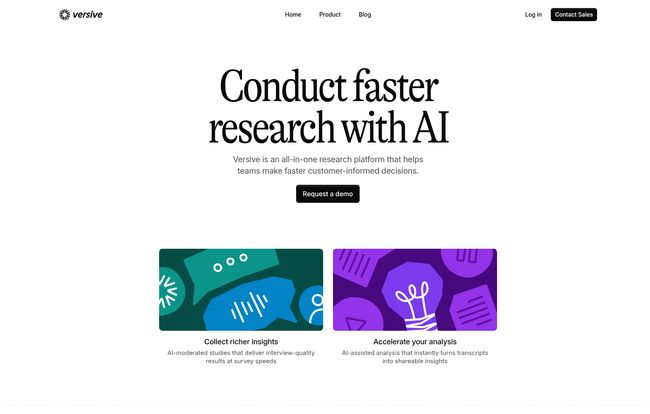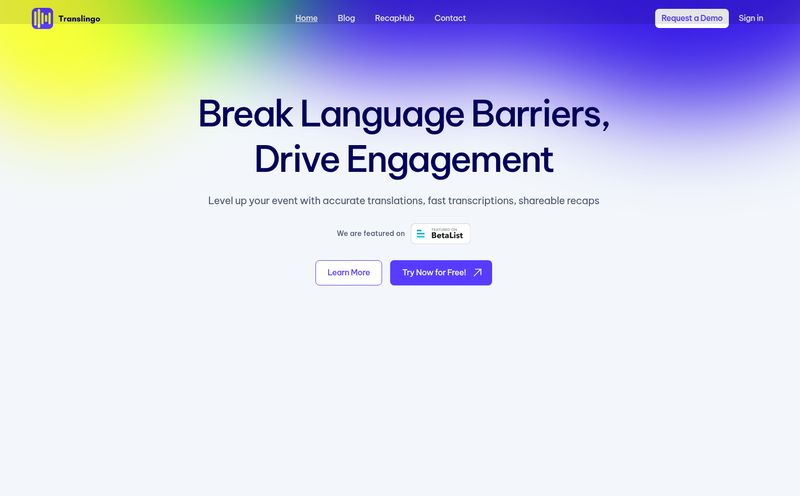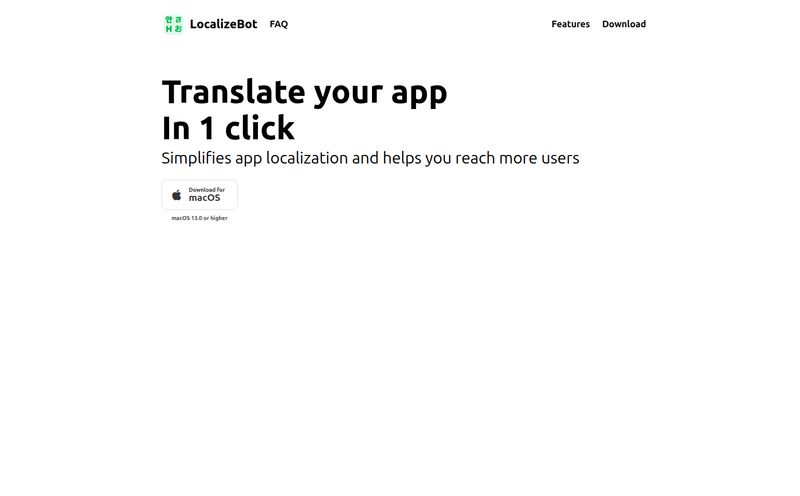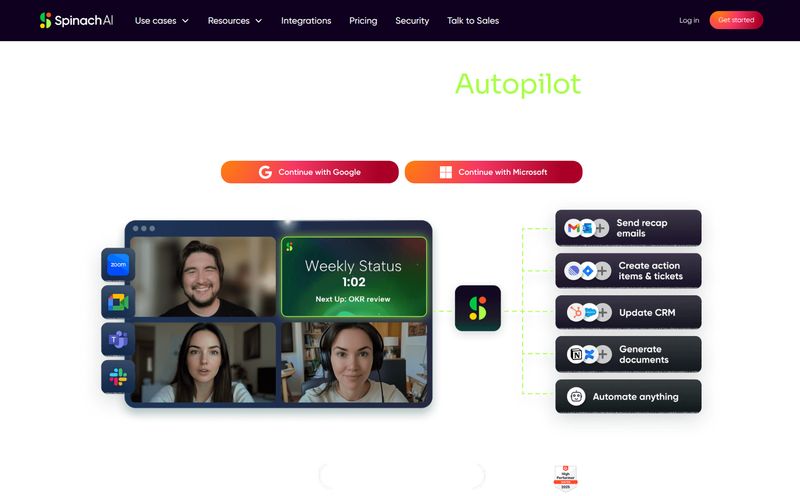We all know we should be doing more user research. It's preached from every product management and marketing pulpit. “Talk to your users!” they yell. But then reality hits. The budget isn't there. The timeline is insane. And the idea of manually transcribing and coding a dozen hour-long interviews makes you want to crawl under your desk and take a long nap.
It’s the classic Catch-22. You need insights to build a better product, but you need to build the product to get the time and resources to get the insights. A real chicken-and-egg problem. For years, I've seen teams just... skip it. They cross their fingers, rely on gut feelings, and hope for the best. Sometimes it works. Most times, it doesn’t.
So when I see a tool like Versive pop up, claiming to “conduct faster research with AI,” my inner skeptic raises an eyebrow. But the tired, overworked part of me leans in a little closer. Could this actually be the thing that breaks the cycle? Let's take a look.
What on Earth is Versive?
At its core, Versive is an all-in-one platform designed to speed up the entire user research process, from asking the first question to sharing the final report. The big hook is its heavy reliance on AI to do the grunt work. Think of it less as a simple survey tool and more like a research assistant that’s been chugging coffee all night so you don't have to.
It’s built for teams that feel that time-crunch. The ones who know the value of data but can’t afford to spend six weeks on a traditional qualitative study. It aims to take you from questions to insights, as they say, “faster and more often.”

Visit Versive
The Features That Actually Caught My Eye
A feature list is just a feature list until you see how it solves a real problem. And boy, does user research have problems to solve. Here’s what stood out to me in Versive's toolkit.
AI-Moderated Interviews: Your Robot Research Assistant
Okay, this is the big one. The idea of AI-moderated interviews is both fascinating and slightly terrifying. Instead of you or a researcher sitting on a Zoom call, Versive's AI can guide a participant through a series of questions. This is a massive unlock for a few reasons. First, scale. You can run dozens of these interviews simultaneously without needing a small army of researchers. Second, consistency. The AI asks the questions the same way every time, removing some human moderator bias.
And for anyone working with a global audience, the platform's ability to handle translations for interviews is a huge plus. No more trying to find a moderator who speaks fluent Portuguese on a Tuesday afternoon.
From Raw Data to 'Aha!' Moments with AI Analysis
This is where I really get excited. Anyone who’s done qual analysis knows the pain. You have hours of transcripts—a wall of text—and you have to somehow find the golden nuggets. It's like panning for gold in a river of mud. Versive uses AI to help synthesize this data. It can pull out themes, generate summaries, and find patterns across multiple interviews.
The testimonial from Tony Phung at Unbounce really hits home here: “The AI-generated summaries are a godsend.” I felt that in my bones. The platform even has an AI chat assistant where you can literally ask questions about your own research data, like “What were the main frustrations users mentioned about the checkout process?” That’s not just saving time; that’s changing how you interact with your own data.
Beyond Interviews: Surveys and Usability Tests
It’s not just a one-trick pony. Versive also bundles in flexible surveys and usability testing. This is smart. I've always been a proponent of mixed-methods research. Sometimes you need the deep, emotional 'why' from an interview, and other times you need the quantitative 'what' from a survey. Having it all in one place just reduces the friction of trying to stitch together data from SurveyMonkey, UserTesting.com, and a folder full of Zoom recordings.
The Good, The Bad, and The AI-Powered
No tool is perfect, right? It's all about trade-offs. Based on what I've seen, here's my take.
The upside is pretty clear: speed and depth. You’re getting access to qualitative insights that would normally be out of reach for fast-moving teams. As Anna Kane from Pitch said, they got “more specific and deeper” insights without the massive effort. That's the dream. Being able to validate a hypothesis in a few days instead of a few months is a genuine competitive advantage.
But there are things to keep in mind. My first thought is the reliance on AI. Can an AI really catch the nuance of a user's sigh, their sarcastic tone, or the hesitation before they answer a sensitive question? I'm not so sure. I think you'll still need a human to review the key moments. The AI gets you 80% of the way there, but a smart researcher provides that final 20% of critical context. It's a powerful assistant, not a full replacement.
Then there's the potential for a bit of a learning curve. A platform this powerful isnt as simple as a Google Form; you’ll need to invest some time to get the most out of it. And finally, the cost. Which leads me to...
A Quick Word on Versive's Pricing
Here’s the part you’ve been scrolling for. Unfortunately, like many B2B SaaS platforms targeting businesses, Versive doesn’t list its pricing publicly. The website's pricing page seems to be down or non-existent, and the main call to action is “Request a demo.”
This is pretty standard. It usually means the pricing is customized based on your company's size, usage, and needs. Don’t expect it to be a cheap-and-cheerful monthly subscription. This is likely a considered investment for teams serious about integrating research into their workflow. The recruiting costs mentioned on the site ($0.25-$2.00 per minute) also give a hint that this is a professional-grade tool.
So, Who is This Really For?
I don't see Versive as a tool for the massive enterprise with a 50-person dedicated UX research department (though they might find it useful for specific projects). I see it as the perfect fit for:
- Product teams at startups and scale-ups who are wearing multiple hats and need answers, like, yesterday.
- Agencies that need to provide quick, data-backed insights for multiple clients without ballooning their overhead.
- Solo marketers or product managers at mid-sized companies who have been tasked with “understanding the customer” but given no headcount to do it.
It's for the doers who are tired of flying blind.
Frequently Asked Questions about Versive
How exactly do AI-moderated interviews work?
The AI uses a predefined script of questions to guide the user. It can present text, images, or even prototypes and ask open-ended questions. It then uses speech-to-text to transcribe the user's verbal responses in real-time for later analysis.
Is Versive going to replace human researchers?
I'd say no. It's more about augmenting them. It handles the most time-consuming parts—recruiting, scheduling, moderating simple interviews, and transcribing. This frees up human researchers to focus on more complex strategic work, like crafting better questions and interpreting the deep-seated motivations behind the answers.
What languages does the platform support?
The website shows an example of translation for Chinese participants, indicating that it supports multiple languages. This is a key feature for any company with an international user base.
Can I bring my own participants to the platform?
While Versive offers a recruiting panel, most platforms of this type also allow you to bring your own users by sharing a unique link. This is great for when you want to talk to a specific segment of your existing customer base.
Is Versive only for qualitative research?
Primarily, yes, its strengths lie in qualitative insights from interviews and open-ended questions. However, the inclusion of 'Flexible Surveys' suggests it can handle quantitative data collection as well, making it a mixed-methods tool.
My Final Thoughts
Look, the world of SaaS tools is crowded. Every week there's a new “game-changer.” But Versive feels a little different. It’s tackling a real, persistent, and expensive problem in the product development lifecycle. The move to leverage AI for the most tedious parts of user research just makes sense. It’s not about removing the human; it's about elevating them to focus on what humans do best: strategy, empathy, and critical thinking.
I'm genuinely optimistic about tools like this. They lower the barrier to entry for good research, and if more teams can make data-informed decisions quickly, that leads to better products for all of us. And maybe, just maybe, it makes the whole process a little more enjoyable. Now that's a feature worth paying for.



